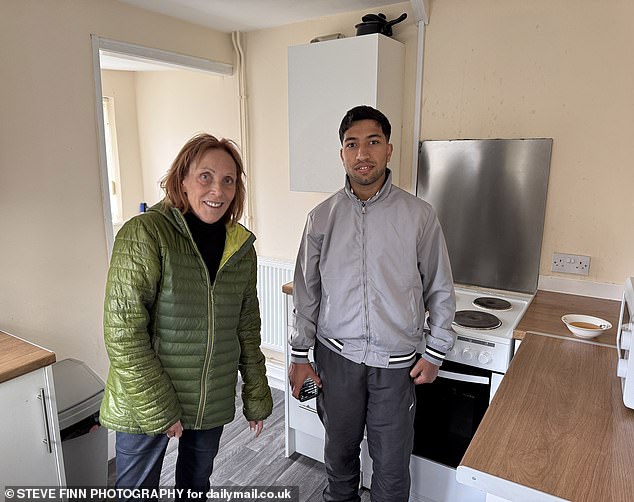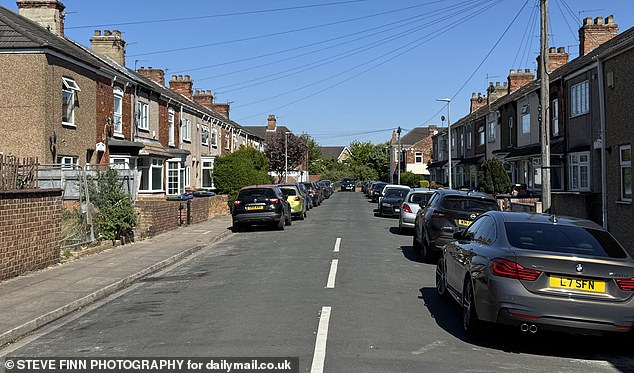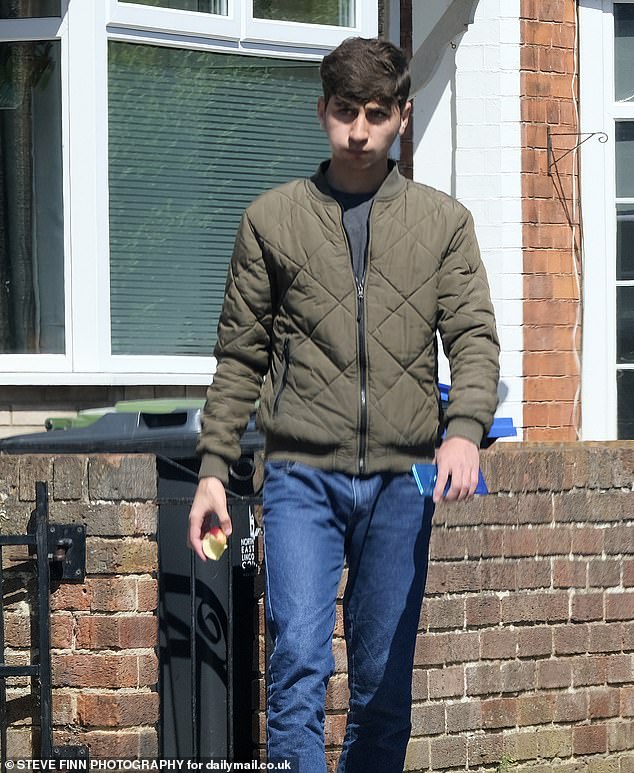A triumphalist speech by Lincolnshire’s new Reform Party mayor to her cheering supporters waving Union flags made headlines across Britain.
At the town hall of the county’s once thriving Grimsby fishing port, Dame Andrea Jenkyns pledged to tackle mass illegal immigration by throwing asylum seekers out of hotels or private houses to make them live under canvas. ‘Tents, not rents,’ she told the crowd the morning after Nigel Farage’s party romped to success in May’s local elections, winning the majority of Greater Lincolnshire’s council seats and elevating her to mayor.
‘Tents are good enough for them in France, they should be good enough here in Britain,’ added Dame Andrea with fervour.
Yet this week, in a cul-de-sac a three-minute drive from the town hall, the Mail found a glaring example of everything she and her party faithful decry. This shabby part of Grimsby is a microcosm of the scenario Britain faces as immigration runs out of control. We discovered three migrants living courtesy of the state in a four-bedroom terraced house with garden and Sky TV after arriving on people-traffickers’ Channel boats.
‘Tents?’ said one of the residents, an incredulous 27-year-old Afghan called Abdul, as he invited me into the house this week.
‘I don’t want to go to a tent when I have a room here which I like. I have been in the UK since 2023. I came on a boat from Belgium, where I had lived for four years. That country refused my claim for asylum so I came to your country instead. I want to stay in this house.
‘I’d like to bring my mother, who is 50, to live in the UK too. She is not allowed, as a woman, to go out alone in Afghanistan. She must cover her face. Her life is restricted, but in the UK she would have freedom.’
Abdul is a polite young man who is having English lessons. But he has been refused asylum on the grounds that the Home Office says his country is safe to return to and, by rights, he should be heading home to his mother, not planning to bring her here.

Abdul, a 27-year-old from Afghanistan, with Sue Reid. Abdul is appealing his case after being refused asylum
Instead of quitting Britain, however, he is appealing his case and it is, of course, the taxpayer who is footing the bill for his lawyers, housing and £49 weekly living allowance.
Abdul shares the house with Ahmed, a Yemeni in his early 20s who the Home Office has just moved from an all-expenses paid Sheffield migrants’ hotel, and Ismail, 18, a fellow Afghan, who speaks no English and arrived in the UK across the Channel a few weeks ago. This type of migrant household is increasingly common.
As this Mail investigation shows, the Labour Government is shutting migrant hotels in the face of out-of-control costs, public hostility and the anti-immigration Reform’s upsurge in popularity. But the newcomers are not going away. Once on British soil, they are being offered houses and flats all over the country by the Home Office to live among ordinary communities.
A disturbing picture of Britain was painted by Sir Keir Starmer this week as he promised to cut immigration in an apparent policy turnaround. The Prime Minister said we are becoming an ‘island of strangers’, an astonishing echo of warnings by the late Tory MP Enoch Powell in his infamous ‘Rivers of Blood’ speech 57 years ago.
But, despite the Prime Minister’s grand rhetoric, last month Serco, one of the three main providers of Home Office asylum accommodation (alongside Mears Group and Clearsprings Ready Homes, whose founder Graham King is now a billionaire after his personal fortune grew by 35 per cent last year) let slip that it is offering private landlords lucrative five-year rent deals to house asylum seekers in towns and cities across the North West, the Midlands and parts of the east of England.
In a list published online (but mysteriously removed after an outcry), Serco named areas where it is seeking new asylum landlords. They range from some of the poorest parts of England, such as inner Birmingham, to the wealthier Fylde coast in Lancashire, the quaint Norfolk Broads and villages in Worcestershire’s Malvern Hills.
There is widespread disquiet over migrant hotels – but the decision to place more asylum seekers in private housing, at a time when many Britons are already struggling to pay their rent and mortgages, is likely to meet with an even worse public backlash.
According to Land Registry records, the proprietor of Abdul, Ahmed and Ismail’s cul-de-sac home in Grimsby (run by a Tory minority administration which faced no elections in May) is Mears Group. One bedroom on the ground floor, designated No.2, was empty when the Mail visited it this week.

The residential street where Abdul, Ahmed and Ismail are living in Grimsby
We found that the Home Office is due to transfer a fourth asylum seeker, a Sudanese man currently in a hotel elsewhere in Britain, to occupy this spare room in the next few days. The 28-year-old came over from France, hiding – it is believed – in a car on a cross-Channel ferry, in the past three months.
On arrival, he claimed asylum and he has told friends he expects to be awarded it before July, giving him ‘residency’ in the UK.
He has also told friends that he plans to bring his girlfriend, who lives in London, to join him at the asylum house. The two met in Calais, where he lived for months in an industrial warehouse with 1,500 of his countrymen after entering border-free Europe in Italy from Libya, then heading to the north French coast en route to Britain.
In messages on social media, he has said he is heading for a glorious seaside destination and posted pictures of Lincolnshire tourist hotspots. It’s a telling example of the fantasies about a land of milk and honey woven by traffickers to lure migrants to pay outrageous fees for illegal Channel crossing.
The Sudanese migrant has also said he plans to drink beer in pubs, sunbathe on the beach and find a job (despite the fact that asylum seekers are not permitted to undertake paid work). After Grimsby, he hopes to move to London where he will ‘rent a flat’ with the funds he has earned. But the truth is that the big winners making real money out of the burgeoning migrant housing crisis are the Government’s three main asylum accommodation providers.
According to the National Audit Office (NAO), this trio will charge British taxpayers £15billion over ten years to put roofs over the heads of thousands of migrants who have already arrived, or are yet to come.
The ballooning accommodation bill – of which £2.5 billion will go to Mears Group, says the NAO number is triple the Home Office’s original estimate of £4.5 billion for the decade-long contracts spanning 2019 to 2029.
The Home Office said this week that the number of asylum seekers it houses increased from around 47,000 in December 2019 to 110,000 by December 2024. Of the 36,000 migrants who crossed the Channel last year, the largest number came from Abdul’s home country, Afghanistan.
Yet despite the enormous costs to Britain, the crossings go on.
According to figures released this week, more than 150,000 migrants have sailed the Channel since official records began in 2018, the majority on traffickers’ small boats. At least 1,100 arrived in Dover by paying gangs during the past week, including 601 on Monday alone, the day that Sir Keir made his speech.

Ismail, 18, from Afghanistan, speaks no English and arrived in the UK across the Channel a few weeks ago. Pictured leaving his Grimsby HMO
In the face of an escalating voter rebellion, the Government has begun closing hotels opened under the Tories, with the numbers down to 210 from a peak of more than 400. Some were shut by the Tories before it lost last year’s General Election but Labour has abandoned 23 since then and a further seven are due to return to normal use this summer. There is, however, a sting in the tail.
As more asylum seekers surge across the Channel, the Government’s three big asylum accommodation companies are under pressure to find spaces in the private housing sector instead.
Less principled landlords happy with migrant tenants are targeting properties in poorer areas, like pockets of Grimsby, where houses are cheap to buy and returns on rents can, therefore, be high. The sale prices in Abdul’s cul-de-sac, for example, have fallen steeply in the past 20 years as the area has declined.
This unorthodox property boom – which has seen sales in down-at-heel Blackpool and Barrow-in- Furness rocket – is swiftly changing the face of once proud and united working-class enclaves.
The Grimsby cul-de-sac, now in the 25th most deprived area of England, was once a desirable part of town where everyone knew their neighbours.
Today, things are very different. Most of the accents I heard were not English and this week I watched residents walking down the street with their heads bowed, ignoring their fellow passers-by.
As one old-time resident told the Mail: ‘It used to be lovely round here. Grimsby had a fantastic fishing port, jobs for everybody and a real community spirit. Now its full of smackheads and troublemakers.’
Veronica Lilliman, 56, who made those remarks last year about an area near Abdul’s cul-de-sac, could now add migrants to the list of new residents.
That is not to say they are causing trouble. Abdul comes across as a gentle individual, who conscientiously put his wheelie bin out for Wednesday morning’s rubbish collection.
But the foreign arrivals have helped, along with growing deprivation, to change the nature of a once close-knit corner of Britain.
And although Serco’s infamous list of areas seeking migrant properties does not include Grimsby, it is clear this is a target area despite a doubling of the council housing waiting list since 2021.
‘There are lots of us here,’ says Abdul. ‘And more are brought in from the boats every day.’
He adds, rather sorrowfully: ‘An Indian family rent the house next to us. We don’t speak. They don’t care about us and we don’t care about them. The only people I know in Grimsby are other migrant friends from Afghanistan who have been sent here like me from the boats.’
This is a sad state of affairs for a town which every resident was once proud to call home.
And it is a terrifying trend that appears destined to be repeated in towns and cities the length and breadth of the country as more and more migrants are moved out of hotels and embedded in our streets.












